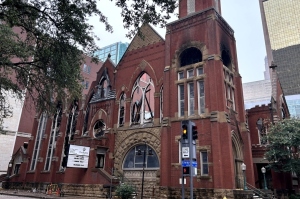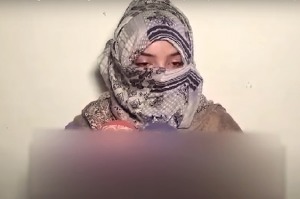Turkey Arrests 20 Suspects in Christian Murder Case
Suspects in Ergenekon network long sought in homicide case to be questioned.
ISTANBUL – In simultaneous operations in nine different provinces of Turkey, authorities yesterday arrested 20 people suspected of playing a role in the murder of three Christians in Malatya in 2007, according to local news reports.
Zekeriya Oz, chief prosecutor overseeing the investigation into a clandestine network known as Ergenekon allegedly aimed at destabilizing the government, ordered the arrests based on information that linked the suspects to both the network and to the Malatya murders, Turkish press reported after Istanbul Chief of Police Chief Huseyin Capkin announced the sweep at a press conference yesterday.
"This was an operation related to the Malatya Zirve publishing house murders," Capkin said, according to online news agency Malatya Guncel. "They were just arrested. This is connected to the Zirve publishing house. That's the framework."
Those apprehended include Ruhi Abat, a Muslim theology professor from Malatya Inonu University, Mehmet Ulger, a retired commander of the Malatya Gendarmerie in service at the time of the murders, and other members of the military. Oz will question the suspects in Istanbul, according to reports.
Police also raided the guesthouse of the Izmir Gendarmerie, seizing computers and documents. News sources listed Malatya, Siirt, Mugla, Mersin and Izmir as some of the cities in which authorities conducted raids and arrests.
A plaintiff attorney in the Malatya murder case, Orhan Kemal Cengiz, told Compass that the names on the list of those arrested were suspects he and his colleagues have been trying to convince the Malatya prosecutor to pursue since the court received a tip in May 2008.
"They are all the usual suspects," Cengiz said. "All their names were mentioned in the first informant letter. Unfortunately, despite all our efforts, we couldn't find anyone to investigate these allegations."
The letter was the first of many informant letters the Malatya court has received since it started hearing the case on Nov. 22, 2007. Penned by someone who identified himself by the pseudonym "Ali Arslan" but unsigned, the letter claimed that Ulger incited Emre Gunaydin, one of the suspects, to carry out the murders and that he communicated with Gunaydin through Abat and two gendarmerie officers, reported Turkish English daily Today's Zaman.
Cengiz said that, though it was the duty of the Malatya prosecutor to pursue leads in the informant letter, the prosecutor deferred the investigation to the military court, which in turn refused to investigate, claiming that the name on the letter was fake and the letter was not signed.
"It was like a joke," Cengiz said.
On April 18, 2007, two Turkish Christians, Necati Aydin and Ugur Yuksel, and German Christian Tilmann Geske, were bound, tortured and then murdered at the office of Zirve Publishing Co., a Christian publishing house in Malatya. The suspects, Salih Guler, Cuma Ozdemir, Hamit Ceker, and Abuzer Yildirim, were arrested while trying to escape the scene of the crime, as was alleged ringleader Gunaydin.
From the beginning of the court hearings, plaintiff lawyers have brought evidence to the court showing the five young suspects were connected to a wider plot to kill the three Christians as well as other key Christian leaders across Turkey. Known as the Cage Plan, the plot is believed to be part of the alleged Ergenekon "deep state" operation to destabilize the government.
The Cage Plan centers on a compact disc found in 2009 in the house of a retired naval officer. The plan, to be carried out by 41 naval officers, termed as "operations" the Malatya killings, the 2006 assassination of Catholic priest Andrea Santoro and the 2007 slaying of Hrant Dink, Armenian editor-in-chief of the weekly Agos.
Cengiz told Compass that new evidence in the Ergenekon case might have convinced Oz to pursue those detained yesterday, and he called the move "a very big step" in shedding light on the Malatya case. He and colleague Erdal Dogan said their efforts – especially a request they sent to Oz on Jan. 18, 2010 asking him to investigate the allegations that Ergenekon members were behind the Malatya murders – surely helped to move the process along.
"I believe our efforts had a very big influence on this," Cengiz said. "We submitted a petition and requested this from Oz last year. He is acting with the Malatya prosecutor on this."
At the request of the Istanbul Chief Prosecutor's Office, the Istanbul Police Department prepared a report last year revealing links between the Malatya murders and Ergenekon, according to Today's Zaman. According to the report, Sevgi Erenerol, spokesperson for a bogus ultranationalist association known as the Turkish Orthodox Church, described foreign missionary activity as "spying" and "provoking."
"A piece of evidence in the report was a conference on missionary activity given by Sevgi Erenerol … at the General Staff's Strategic Research and Study Center," reported Today's Zaman.
Erenerol was arrested in connection with Ergenekon in 2008. Her suspected links with those thought to have masterminded the Zirve murders may have influenced yesterday's arrests, Today's Zaman reported.
She is also believed to be one of the key people behind false accusations against two members of Turkey's Protestant Church, Hakan Tastan and Turan Topal, who were arrested in October 2006 for insulting Turkishness and Islam because they openly shared their faith.
After four years of legal battle, a judge finally acquitted the two Christians of insulting Turkey and its people by spreading Christianity, but not without slapping them with a hefty fine for a spurious charge. The two men are in the process of appealing the fine.
The Turkish Constitution grants all citizens the right to speak about their faith.
Plaintiff attorneys in the Malatya murders case said they believe yesterday's arrests bring them closer to their requests that the Malatya murders case file be joined to that of the Ergenekon trial.
"From now on, we can predict it is very possible that our case will be sent to Istanbul soon and that these two cases will be merged," said Cengiz.
The next Malatya hearing is scheduled for April 29.




























